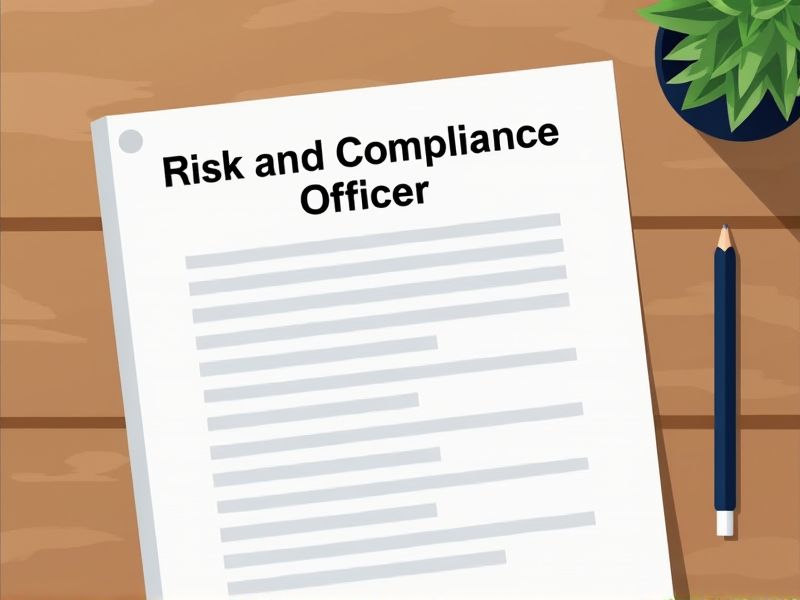
The evolving regulatory landscape requires Risk and Compliance Officers to possess specialized knowledge to navigate complex legal frameworks effectively. Without certain certifications, these professionals may struggle to manage risks and ensure compliance, leading to potential legal and financial repercussions for organizations. Certifications also enhance credibility, a critical factor when advising on high-stakes compliance matters. Here are some important certifications essential for Risk and Compliance Officers.
Certified Compliance and Ethics Professional (CCEP)
A Certified Compliance and Ethics Professional (CCEP) designation enhances a Risk and Compliance Officer's credibility by validating their expertise and understanding of regulatory compliance standards. This certification provides specialized knowledge that can effectively guide organizations in mitigating legal and ethical risks. It equips professionals with the tools required to establish and maintain robust compliance programs, ensuring adherence to laws and regulations. Organizations benefit from reduced risk of non-compliance penalties, given that their officers are trained in identifying and managing potential compliance issues.
Certified in Risk and Information Systems Control (CRISC)
The CRISC certification equips Risk and Compliance Officers with a comprehensive understanding of enterprise risk management and its impact on IT systems. It validates their skills in identifying and assessing IT risk, creating a bridge between technical and organizational perspectives. With increased regulatory requirements globally, having CRISC ensures that officers can effectively design and implement risk management strategies. The certification enhances credibility and trust among stakeholders by demonstrating proficiency in aligning IT risk with enterprise risk management.
Certified Regulatory Compliance Manager (CRCM)
Holding a Certified Regulatory Compliance Manager (CRCM) designation elevates a Risk and Compliance Officer's understanding of regulatory frameworks, leading to enhanced risk management. Mastery of compliance laws through CRCM directly reduces the chance of costly regulatory violations for organizations. Possession of a CRCM certification strengthens trust among stakeholders, benefiting corporate governance. CRCM training equips officers with industry-recognized best practices, optimizing internal compliance processes and controls.
Certified Fraud Examiner (CFE)
Certified Fraud Examiners possess advanced knowledge in identifying and mitigating fraud, which enhances the effectiveness of a Risk and Compliance Officer by adding a specialized skill set. Their expertise in investigative techniques allows risk teams to proactively detect potential financial threats and implement relevant controls. Understanding the legal elements of fraud, CFEs help ensure organizational practices comply fully with applicable laws and regulations, reducing the risk of legal penalties. The analytical skills of a CFE contribute to a more robust fraud risk assessment framework, helping organizations anticipate and adapt to emerging risks.
Financial Risk Manager (FRM)
The increasing complexity of financial markets has heightened the necessity for specialized roles like the Financial Risk Manager to navigate potential pitfalls. Their expertise allows Risk and Compliance Officers to develop a more robust risk assessment framework, ensuring institutional integrity. Regulatory changes occur frequently, and an FRM's knowledge keeps policies evolving to meet new standards. Effective management of credit, market, and operational risks becomes more precise with an FRM's insight, reducing the likelihood of costly financial missteps.
Professional Risk Manager (PRM)
A Professional Risk Manager (PRM) provides the expertise necessary for identifying and assessing potential threats, thereby supporting a Risk and Compliance Officer in maintaining an organization's integrity. Their specialized training equips them with the ability to forecast and mitigate financial risks, effectively minimizing losses. The PRM designation enhances the credibility of a Risk and Compliance Officer, ensuring stakeholders maintain confidence in the organization's risk management practices. With regulatory landscapes constantly evolving, a PRM's insights keep risk management strategies aligned with compliance requirements, reducing the likelihood of legal repercussions.
Certified Risk Manager (CRM)
Certified Risk Manager (CRM) certification enhances a Risk and Compliance Officer's expertise in identifying and mitigating potential threats. The CRM provides comprehensive training in risk assessment methodologies, enabling precise analysis and response strategies. This certification assures organizations of the officer's competency, thus fostering trust and reliability in risk management processes. Possessing a CRM often leads to improved compliance outcomes, reducing the likelihood of regulatory penalties.
Certified Information Privacy Professional (CIPP)
Certified Information Privacy Professional (CIPP) certification equips Risk and Compliance Officers with advanced knowledge of the ever-evolving privacy regulations, which is crucial for maintaining compliance. This certification enhances their ability to assess and manage privacy risks effectively, thereby safeguarding organizational data. A solid understanding of privacy best practices and frameworks enables these professionals to develop robust compliance strategies. Adoption of the CIPP credential signals to stakeholders and regulatory bodies that the organization takes data protection seriously, potentially reducing legal liabilities.
Certified Anti-Money Laundering Specialist (CAMS)
The CAMS certification equips Risk and Compliance Officers with specialized knowledge to detect and prevent money laundering activities. Possessing CAMS enhances the officer's ability to implement effective anti-money laundering policies and procedures, reducing institutional risk. Financial institutions often face complex regulatory environments; hence, CAMS-certified professionals bring essential skills to navigate these challenges. The expertise gained through CAMS certification also aids in efficiently identifying suspicious transactions, ensuring institutional compliance with global AML standards.
ISO 31000 Risk Management Certification
ISO 31000 Risk Management Certification equips risk and compliance officers with a standardized approach to managing risks, enhancing their ability to identify, assess, and mitigate potential threats effectively. Certification aligns their risk management practices with international standards, boosting credibility and trust among stakeholders. Acquiring this certification demonstrates a commitment to continuous improvement and professional development, which is crucial in adapting to the dynamic risk landscape. Trained officers can better integrate risk management into an organization's operations, improving decision-making and resilience.
Summary
When you obtain certifications as a Risk and Compliance Officer, you enhance credibility and demonstrate proficiency in your field. This often results in increased trust from your organization and clients, leading to more effective risk management and compliance strategies. Your enhanced skills typically lead to improved organizational efficiency and reduced incidences of non-compliance. Gaining certifications can position you as a subject matter expert, potentially opening doors to career advancement and leadership opportunities.
